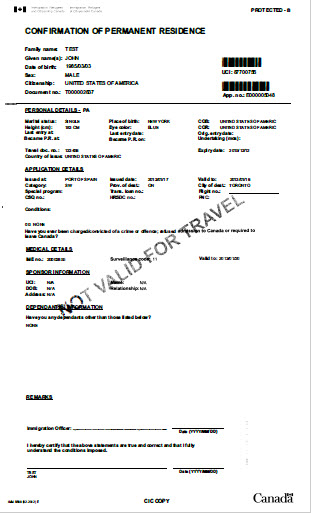The Confirmation of Permanent Residence (CoPR) is an important document that confirms an individual’s permanent resident status in Canada. It serves as proof that an individual has been approved for permanent residency and is allowed to live and work in Canada permanently. The CoPR is issued by the Immigration, Refugee and Citizenship Canada (IRCC) and is an essential part of the process of becoming a permanent resident in Canada.
The process of obtaining a CoPR starts with an individual applying for permanent residency in Canada. This can be done through various immigration programs, such as Express Entry, Provincial Nominee Program, or through family sponsorship. Once the application has been reviewed and approved by the Canadian government, the individual will receive a CoPR. This document will include important information about the individual, such as their name, date of birth, and their status as a permanent resident in Canada.
The CoPR is a physical document that must be kept safe, as it serves as proof of an individual’s permanent resident status in Canada. It is important to note that a CoPR is not a Canadian passport or a form of identification, and it should not be used as such. An individual who has a CoPR must carry a valid passport from their country of origin or a valid permanent resident card (PR card) at all times when entering or leaving Canada.
In addition to serving as proof of permanent resident status, the CoPR is also required when applying for certain government services or benefits, such as the Canada Pension Plan or Employment Insurance. It is also important for individuals who want to apply for Canadian citizenship, as they must provide their CoPR as part of the application process.

Differences between the Confirmation of Permanent Residence (CoPR) and the Permanent Resident Card (PR Card)
The major difference between the CoPR and the PR card is that one is a document that proves the change of status event, namely the CoPR, versus the other is a document that facilitates travel from and back to Canada. Theoretically, if one never travels outside of Canada, he/she does not need to own a PR card, since the CoPR would be the proof of an individual’s permanent status in Canada. But practically speaking, provinces such as BC, requires to see the actual PR card in person, in order to allow the normal issuance of the provincial driver’s license.
So what’s the difference between the two expiry dates – on CoPR and on PR card? For those who were issued the CoPR while they are still residing overseas, the expiry date on the CoPR is the last day that they are allowed to travel to land. The same expiry date would have been recorded on the permanent resident visa counterfoil, for people who are from a visa required country. Hence, it is crucial for them to travel before the CoPR expiry date, as they cannot travel after that date, and in normal circumstances, no extension of that date would be given. People who missed their CoPR expiry date would need to start the PR application process over again.
PR card expiry, on the other hand, denotes only a travel document expiry date, similar to the expiry date of a passport. The PR status does not expire just because an individual’s PR card is expired. However, since permanent residents in Canada are required to meet residency obligations by being physically present in Canada, PR card, if not renewed properly, might lead to trouble. Visit the page on PR residency obligation page, for more details on this issue.
If you need assistance in issues and concerns with CoPR, PR card, residency obligation, and other topics, let us know and we will try our best to resolve them.
The content above is not intended to provide legal advice or opinions of any kind and may not be used for professional or commercial purposes. E&OE.







